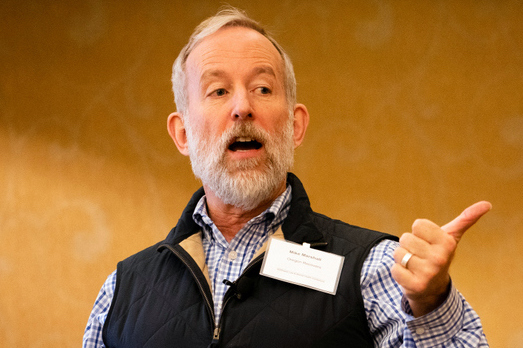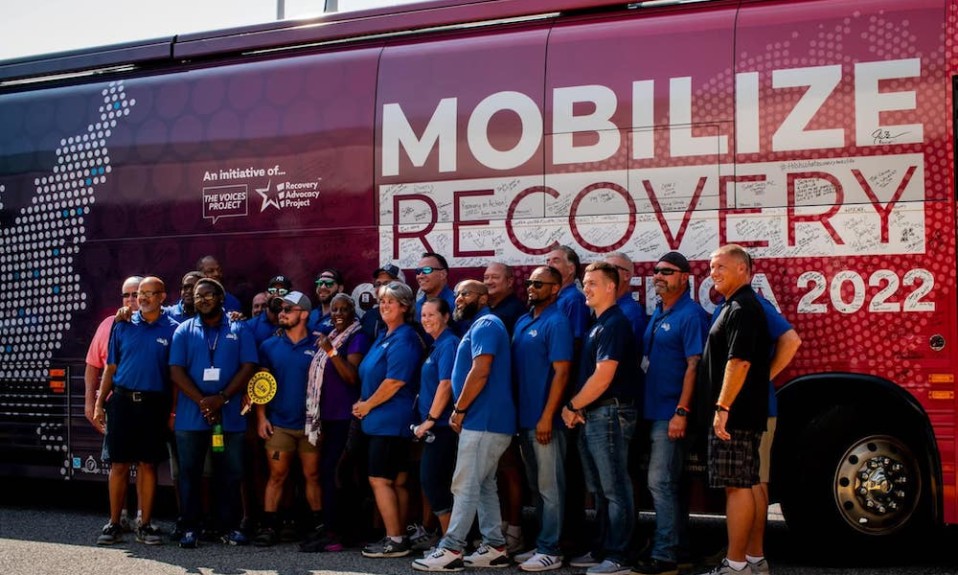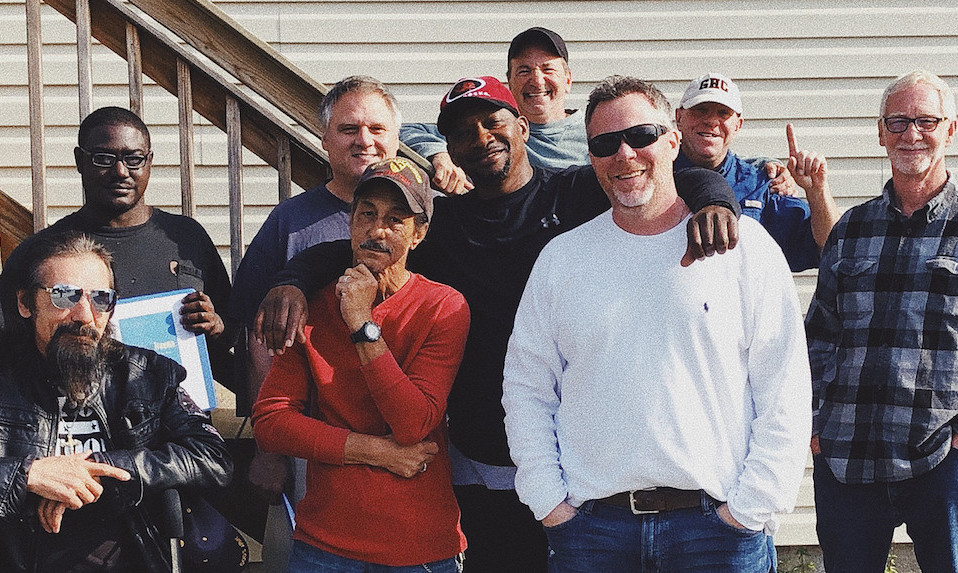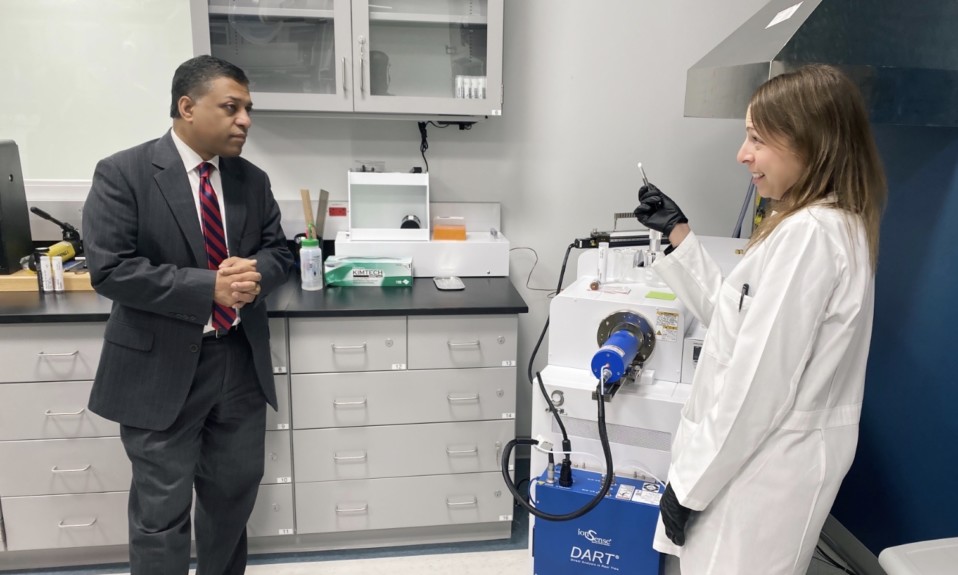The organization and its founder have a bold goal to pull Oregon out of the mire of an addiction crisis
By Jennifer Taylor
When Mike Marshall decided to take on the addiction crisis in Oregon more than four years ago, he knew he was entering from a dismal starting point. It had been well established by then that Oregon ranked among the worst states in the nation for substance use disorder (SUD) and mental health problems. Simultaneously, Oregon ranked among the worst states for access to care, according to a 2019 state government report.
Here is a sampling of how Oregon stacked up: In 2017, the report notes, the state ranked first in marijuana use and opioid misuse, second in methamphetamine use and fourth in cocaine use. Additionally, Oregon was fourth in both alcohol and substance use disorders, second for the highest rate of mental illness, and third for needing but not receiving treatment for alcohol and illicit drugs.
That’s not exactly a set of rankings to brag about.
In 2017, Marshall, who has been in recovery for 13 years and who had been involved in the national political scene for most of his career, decided his next campaign would be to help save the state from the illness that once had him in its grips. And so Oregon Recovers—an inclusive statewide coalition made up of people in recovery, as well as their friends and family—was born with Marshall at the helm. Its mission: to ensure world-class prevention, treatment and recovery support services for Oregonians with SUD. And that’s where the hard work began.
We’re building a movement. That’s been the challenge of why addiction is continually stigmatized as the poor stepchild in the healthcare system. There wasn’t a constituency advocating effectively.”
—Mike Marshall, founder and executive director of Oregon Recovers
Marshall spoke with TreatmentMagazine.com recently about his uphill challenge to rid Oregon of its near-worst rankings status and his ambitious goal to transform the state into a recovery haven. At times, the frustration in trying to make progress, especially during the COVID-19 pandemic when substance use increased while treatment center beds decreased, hangs in his voice. But muffling the frustration is determination. Meet Mike Marshall.
Q: How did you come to found Oregon Recovers?
A: First off, what people should know about me is [that] I’m a person in long-term recovery. I’ve been in recovery for 13 years—from alcohol and meth and any other drug that was available. So In 2014, I was the campaign manager for the governor of Oregon [John Kitzhaber], his reelection campaign. And right afterward, there was a four-part series in The Oregonian about how badly Oregon deals with its addiction crisis. I started talking to [Kitzhaber] about how to fix it. And then because of a scandal, he suddenly resigned a month after being sworn into office. So I went off and ran a civic organization for a few years, but very much was cognizant of the problems we had here and the problems my friends in recovery were experiencing [in] trying to find access to resources and then be supported in their recovery.
I started having one-off conversations with a series of folks that work in recovery centers, for treatment providers and for the state, and out of that we gave birth to Oregon Recovers. We’ve been advocating for four and a half years, in some ways very successfully. But the bottom line is the addiction crisis is getting worse in Oregon—not better.
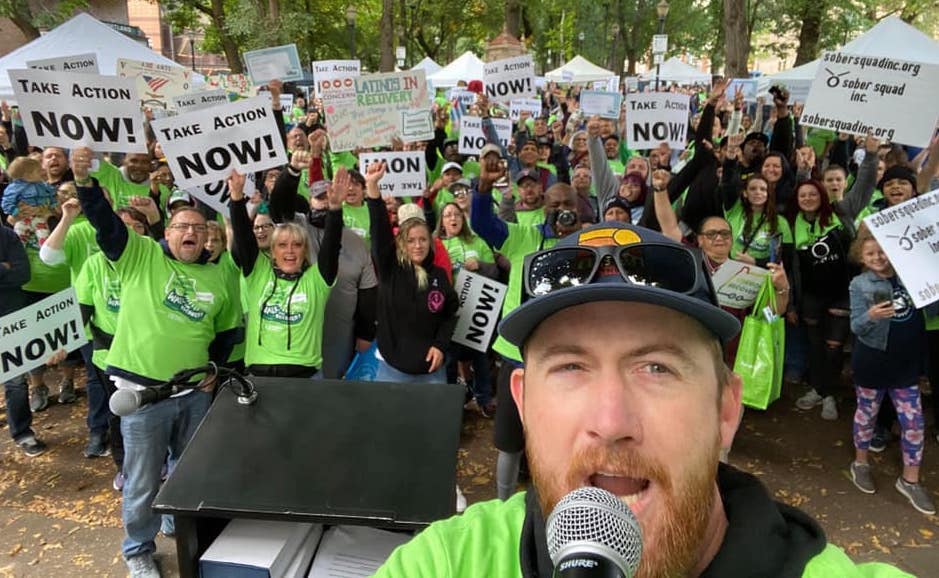
Q: Why was founding Oregon Recovers important to you?
A: I live a privileged life, even though I hit rock-bottom 13 and a half years ago. I was a gay man living in San Francisco at the time. I had access to a set of resources—I borrowed $15,000 from a friend and went to treatment. I had the luxury the next year of working part-time and in a role that paid me well [and] allowed me to really focus on strengthening my recovery. Very few people in Oregon have that. We don’t have access to treatment. We don’t have recovery support. So I recognize that [I was] a privileged man. I had a skill set [and] a contact list of influential people in Oregon, and I wanted to make sure that other people in recovery have the opportunities I had, and the life that I now have as a consequence of getting into recovery.
Q: Tell me about this proclamation on your website: “Within five years, Oregon will be known as the ‘Recovery State.’”
A: We’re building a movement. That’s been the challenge of why addiction is continually stigmatized as the poor stepchild in the healthcare system. There wasn’t a constituency advocating effectively. The treatment providers do lobbying work, but there wasn’t a broader movement.
Our goal was to build power and [build] a recovery community [with] people like me in recovery and the people who love us and take care of us—friends and family and people in the treatment and recovery world coming together and advocating for a single vision of what a system of care should look like. We needed to build the political will to do that. We needed to get the state to develop a strategic plan to do that. And then we needed to resource it to create a permanent, sustainable line of revenue to pay for that system of care.
The only bipartisan issue that’s left in America is combating addiction. I can get Republicans and Democrats to sit down around the table not for 45 minutes but for two days. They have a shared history of a family member themselves grappling with this issue.”
—Mike Marshall
If we could do that in five years, we are going to profoundly change the way addiction shows up in Oregon. We built some political capital and political movement, [and] we have a strategic plan now that the state completed in 2020. But the sustainable line of revenue has to be by raising the price of alcohol. If you raise the price of alcohol, you reduce underage drinking and binge drinking.
[Then] use that revenue as a dedicated line to increase access to treatment and recovery support. We had a plan to get to the recovery state. The challenge has been the alcohol industry has blocked that plan. So now we have more work to do politically.
Q: You talk about Oregon’s rankings with access to addiction treatment and how it’s been consistently at the bottom of all the states. Why do you think Oregon ranks that low?
A: There’s no system of care. Primary care doesn’t take responsibility for people’s addiction. Prior to the Affordable Care Act, SUD treatment and recovery support lived outside the healthcare system. Arguably, it still does, but at least there’s been some level of integration. The state has not had a plan to identify in every county or every community [a specific] level of service, whether it’s access to treatment or recovery support [or] an intervention system that isn’t criminally based. We don’t have that infrastructure in place. Pre-COVID, you basically had mom-and-pop shops that were trying to provide a response to a health problem or an illness without a comprehensive plan on how to accomplish that. COVID was gasoline on the fire from that perspective.
It’s gotten really bad, and it’s because no one’s been in charge. There hasn’t been a plan, and the healthcare industry has not incorporated substance use disorder into their physical care responsibilities.
Q: Another one of your principles is: Oregon Recovers will work to eradicate the stigma associated with addiction, which serves as a barrier to recovery. How would you like to see it changed?
A: The traditional stigma exists that this is a moral failing, right? Then [there’s] 12-step recovery, which I’m a big part of and is the reason I’m in recovery today. The anonymity aspect of it means that people have lived with secrets—their recovery. Which is ironic, because 12-step programs say you shouldn’t live with secrets, and yet it’s anonymous.
The problem has been that most states don’t have anyone in charge. … When you’re the worst in the nation, it’s not a matter of fixing programs—it’s a matter of having a campaign to fix it and putting someone in charge and bringing people to the table and holding them accountable.”
—Mike Marshall
We do annual walks for recovery where we have people walk through downtowns of five cities [wearing] T-shirts. It is very much like a gay pride parade. It certainly was like that for me as a gay man. The first day we did the first walk for recovery in 2018—the excited nervousness of people seeing me as I’m in recovery, and then seeing these families and these parents who were there to support their kids and the little kids were there to support their parents. Instead of being in a church basement, where we only talked amongst ourselves, we were walking through the streets and promoting recovery and illuminating that addiction is a crisis in Oregon. There is a solution; we embody that solution. Celebrating recovery, I think, is the best way to combat stigma.
Q: About a year ago, I read that you wrote an open letter to Oregon governor Kate Brown advocating for the state’s Alcohol and Drug Policy Commission’s blueprint for an addiction recovery continuum of care. What has happened since?
A: The only bipartisan issue that’s left in America is combating addiction. I can get Republicans and Democrats to sit down around the table not for 45 minutes but for two days. They have a shared history of a family member themselves grappling with this issue. They could care less about [former president Donald] Trump or [former presidential candidate Hillary] Clinton—they’re going to come together.
We have a governor’s race next year, and we’re working with the treatment providers in the recovery community to make sure [that] all the candidates on both sides of the aisle are educated about addiction, understand there’s a solution. And then we’ll get them on record saying we’re going to prioritize it amongst the many things that need to be prioritized and that this will happen.
Q: Do other states have existing blueprints? If so, is there a model that you support?
A: That’s a great question. I don’t think any state has a blueprint as extensive as the one that we have created here. And our blueprint, our strategic plan, is hardly perfect, right? It needs to be improved over time.
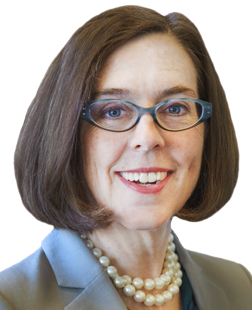
But the problem has been that most states don’t have anyone in charge. We asked at the very beginning for Gov. Brown to appoint a recovery czar. When you’re the worst in the nation, it’s not a matter of fixing programs—it’s a matter of having a campaign to fix it and putting someone in charge and bringing people to the table and holding them accountable. We don’t have that in the system. I don’t think any other state does either.
I like to believe our strategic plan is leading the country and putting it all into one targeted document.
Q: What has taken place since the founding of Oregon Recovers that gives you hope?
A: Oh my God! Within the legislature, there’s a much better cognizance of not just the high level of addiction in Oregon, but also the consequences relative to foster care, high school graduation rates and homelessness that policymakers on both sides of the aisle are beginning to understand. All of those things have gotten worse in a larger respect because the addiction process has gotten worse. But the bigger thing is, we’ve built a community of over 5,000 people in the last four years who have participated in a walk for recovery; have attended the annual summit; have come to Advocacy Day in Salem; and have tuned in to a Zoom chat about some aspect of addiction and recovery. We have several thousand donors. We have 60 organizations that are funding our work. We’ve really started to build a movement of people in recovery and, in the process, have saved a lot of individual lives and have laid the groundwork for real systemic change.


